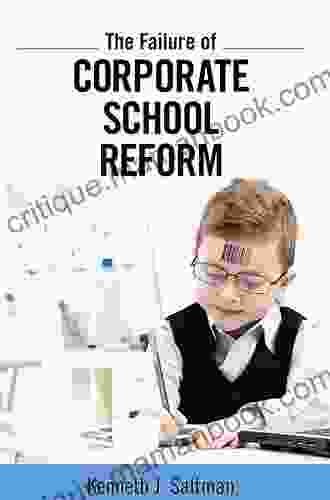The Failure of Corporate School Reform: Critical Interventions

Corporate school reform has been a major force in education policy for over two decades. Its proponents have argued that it can improve student achievement, close achievement gaps, and make schools more efficient. However, a growing body of research has shown that corporate school reform has failed to deliver on its promises. In fact, it has often exacerbated educational inequality and undermined democratic values.
This article examines the failure of corporate school reform. We will begin by providing a brief overview of the history and key features of corporate school reform. We will then discuss the evidence of its failure, drawing on research and case studies. Finally, we will conclude by calling for a renewed commitment to public education and democratic principles in order to address the challenges facing our schools.
Corporate school reform emerged in the 1980s as a response to concerns about declining student achievement and rising costs. Proponents of corporate school reform argued that the private sector could provide more efficient and effective educational services than the public sector.
4.8 out of 5
| Language | : | Spanish |
| File size | : | 15142 KB |
| Lending | : | Enabled |
Key features of corporate school reform include:
- Increased choice and competition. Corporate school reform policies often promote school choice, allowing parents to choose from a variety of public and private schools. This is often accompanied by increased competition between schools, as they compete for students and funding.
- Increased accountability. Corporate school reform policies also often emphasize accountability, with schools being held responsible for student achievement. This is often measured through standardized testing.
- Increased privatization. Corporate school reform policies often lead to increased privatization of education, with private companies playing a greater role in the operation of public schools.
There is a growing body of research that shows that corporate school reform has failed to deliver on its promises. In fact, it has often exacerbated educational inequality and undermined democratic values.
Corporate school reform policies have been shown to exacerbate educational inequality. This is because they often lead to increased segregation, with students from wealthy families attending better schools than students from poor families. This is due to a number of factors, including:
- School choice policies. School choice policies allow parents to choose from a variety of public and private schools. However, this often leads to increased segregation, as wealthy families can afford to send their children to better schools.
- Increased accountability. Accountability policies, such as standardized testing, often lead to increased pressure on schools to focus on teaching to the test. This can lead to a narrowing of the curriculum and a decrease in the quality of instruction. This is especially harmful to students from low-income families, who are more likely to attend schools with fewer resources.
- Increased privatization. Increased privatization of education can lead to a decrease in the quality of education for all students. This is because private companies are often more interested in making a profit than in providing a quality education.
Corporate school reform policies also often undermine democratic values. This is because they often lead to increased top-down control of education and a decrease in the voice of parents and teachers. This is due to a number of factors, including:
- Increased standardization. Corporate school reform policies often lead to increased standardization of education. This means that all schools are required to teach the same curriculum and use the same assessments. This can stifle creativity and innovation, and it can make it difficult for schools to meet the needs of their students.
- Increased testing. Corporate school reform policies often lead to increased testing. This can be stressful for students and teachers, and it can take away from valuable instructional time. It can also lead to a narrowing of the curriculum, as schools focus on teaching to the test.
- Increased privatization. Increased privatization of education can lead to a decrease in the voice of parents and teachers. This is because private companies are often not accountable to the public.
The evidence is clear: corporate school reform has failed to deliver on its promises. In fact, it has often exacerbated educational inequality and undermined democratic values. It is time for a renewed commitment to public education and democratic principles in order to address the challenges facing our schools.
We need to invest in our public schools and ensure that all students have access to a quality education. We need to give parents and teachers a greater voice in education policy. And we need to hold our schools accountable for the quality of education they provide.
Only by taking these steps can we ensure that all students have the opportunity to succeed in school and in life.
4.8 out of 5
| Language | : | Spanish |
| File size | : | 15142 KB |
| Lending | : | Enabled |
Do you want to contribute by writing guest posts on this blog?
Please contact us and send us a resume of previous articles that you have written.
 Top Book
Top Book Novel
Novel Fiction
Fiction Nonfiction
Nonfiction Literature
Literature Paperback
Paperback Hardcover
Hardcover E-book
E-book Audiobook
Audiobook Bestseller
Bestseller Classic
Classic Mystery
Mystery Thriller
Thriller Romance
Romance Fantasy
Fantasy Science Fiction
Science Fiction Biography
Biography Memoir
Memoir Autobiography
Autobiography Poetry
Poetry Drama
Drama Historical Fiction
Historical Fiction Self-help
Self-help Young Adult
Young Adult Childrens Books
Childrens Books Graphic Novel
Graphic Novel Anthology
Anthology Series
Series Encyclopedia
Encyclopedia Reference
Reference Guidebook
Guidebook Textbook
Textbook Workbook
Workbook Journal
Journal Diary
Diary Manuscript
Manuscript Folio
Folio Pulp Fiction
Pulp Fiction Short Stories
Short Stories Fairy Tales
Fairy Tales Fables
Fables Mythology
Mythology Philosophy
Philosophy Religion
Religion Spirituality
Spirituality Essays
Essays Critique
Critique Commentary
Commentary Glossary
Glossary Bibliography
Bibliography Index
Index Table of Contents
Table of Contents Preface
Preface Introduction
Introduction Foreword
Foreword Afterword
Afterword Appendices
Appendices Annotations
Annotations Footnotes
Footnotes Epilogue
Epilogue Prologue
Prologue Adam Nicholls
Adam Nicholls Jennise Beverly
Jennise Beverly Paul Midler
Paul Midler Donald J Boudreaux
Donald J Boudreaux Nicolas Billon
Nicolas Billon Angie Fox
Angie Fox Corinne Noirot
Corinne Noirot Nomi Eve
Nomi Eve Ken Nelson
Ken Nelson Marshall Armstrong
Marshall Armstrong Anne Fota
Anne Fota Paula Greathouse
Paula Greathouse Marjorie Druker
Marjorie Druker Tom Alesia
Tom Alesia Timothy G Spokes
Timothy G Spokes G S Jennsen
G S Jennsen Leonardo Urdaneta
Leonardo Urdaneta Judith Thompson
Judith Thompson Paul Lawson
Paul Lawson Michael Moats
Michael Moats
Light bulbAdvertise smarter! Our strategic ad space ensures maximum exposure. Reserve your spot today!

 Arthur Conan DoyleUnderstanding the Four Purposes of Money Finances for Financial Well-being
Arthur Conan DoyleUnderstanding the Four Purposes of Money Finances for Financial Well-being Simon MitchellFollow ·9.8k
Simon MitchellFollow ·9.8k Aaron BrooksFollow ·10.8k
Aaron BrooksFollow ·10.8k Clayton HayesFollow ·6.1k
Clayton HayesFollow ·6.1k William ShakespeareFollow ·14.5k
William ShakespeareFollow ·14.5k Dillon HayesFollow ·8k
Dillon HayesFollow ·8k Roberto BolañoFollow ·17.1k
Roberto BolañoFollow ·17.1k Branson CarterFollow ·18.5k
Branson CarterFollow ·18.5k Walter SimmonsFollow ·2.4k
Walter SimmonsFollow ·2.4k

 Dan Henderson
Dan HendersonPaper Blood: Two of the Ink Sigil
By D.S. Otis In...

 Joseph Conrad
Joseph ConradStarting Up: Critical Lessons from 10 New Schools
Starting a new school...

 William Powell
William PowellThe Peculiar World of Funny Science Fiction Comedy: Where...
Prepare yourself for an...

 Edgar Hayes
Edgar HayesUkulele Songs for Beginners: A Comprehensive Guide to...
Embark on a musical journey with the...

 Ralph Turner
Ralph TurnerDogs vs. Chickens: A Comprehensive Guide to Choosing the...
Dogs and chickens are both popular...
4.8 out of 5
| Language | : | Spanish |
| File size | : | 15142 KB |
| Lending | : | Enabled |












